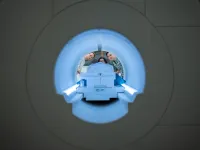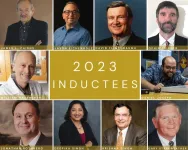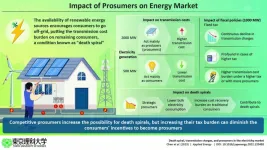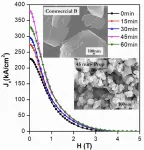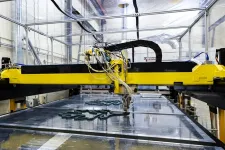(Press-News.org) A new artificial intelligence system called a semantic decoder can translate a person’s brain activity — while listening to a story or silently imagining telling a story — into a continuous stream of text. The system developed by researchers at The University of Texas at Austin might help people who are mentally conscious yet unable to physically speak, such as those debilitated by strokes, to communicate intelligibly again.
The study, published in the journal Nature Neuroscience, was led by Jerry Tang, a doctoral student in computer science, and Alex Huth, an assistant professor of neuroscience and computer science at UT Austin. The work relies in part on a transformer model, similar to the ones that power Open AI’s ChatGPT and Google’s Bard.
Unlike other language decoding systems in development, this system does not require subjects to have surgical implants, making the process noninvasive. Participants also do not need to use only words from a prescribed list. Brain activity is measured using an fMRI scanner after extensive training of the decoder, in which the individual listens to hours of podcasts in the scanner. Later, provided that the participant is open to having their thoughts decoded, their listening to a new story or imagining telling a story allows the machine to generate corresponding text from brain activity alone.
“For a noninvasive method, this is a real leap forward compared to what’s been done before, which is typically single words or short sentences,” Huth said. “We’re getting the model to decode continuous language for extended periods of time with complicated ideas.”
The result is not a word-for-word transcript. Instead, researchers designed it to capture the gist of what is being said or thought, albeit imperfectly. About half the time, when the decoder has been trained to monitor a participant’s brain activity, the machine produces text that closely (and sometimes precisely) matches the intended meanings of the original words.
For example, in experiments, a participant listening to a speaker say, “I don’t have my driver’s license yet” had their thoughts translated as, “She has not even started to learn to drive yet.” Listening to the words, “I didn’t know whether to scream, cry or run away. Instead, I said, ‘Leave me alone!’” was decoded as, “Started to scream and cry, and then she just said, ‘I told you to leave me alone.’”
Beginning with an earlier version of the paper that appeared as a preprint online, the researchers addressed questions about potential misuse of the technology. The paper describes how decoding worked only with cooperative participants who had participated willingly in training the decoder. Results for individuals on whom the decoder had not been trained were unintelligible, and if participants on whom the decoder had been trained later put up resistance — for example, by thinking other thoughts — results were similarly unusable.
“We take very seriously the concerns that it could be used for bad purposes and have worked to avoid that,” Tang said. “We want to make sure people only use these types of technologies when they want to and that it helps them.”
In addition to having participants listen or think about stories, the researchers asked subjects to watch four short, silent videos while in the scanner. The semantic decoder was able to use their brain activity to accurately describe certain events from the videos.
The system currently is not practical for use outside of the laboratory because of its reliance on the time need on an fMRI machine. But the researchers think this work could transfer to other, more portable brain-imaging systems, such as functional near-infrared spectroscopy (fNIRS).
“fNIRS measures where there’s more or less blood flow in the brain at different points in time, which, it turns out, is exactly the same kind of signal that fMRI is measuring,” Huth said. “So, our exact kind of approach should translate to fNIRS,” although, he noted, the resolution with fNIRS would be lower.
This work was supported by the Whitehall Foundation, the Alfred P. Sloan Foundation and the Burroughs Wellcome Fund.
The study’s other co-authors are Amanda LeBel, a former research assistant in the Huth lab, and Shailee Jain, a computer science graduate student at UT Austin.
Alexander Huth and Jerry Tang have filed a PCT patent application related to this work.
Frequently Asked Questions
Could this technology be used on someone without them knowing, say by an authoritarian regime interrogating political prisoners or an employer spying on employees?
No. The system has to be extensively trained on a willing subject in a facility with large, expensive equipment. “A person needs to spend up to 15 hours lying in an MRI scanner, being perfectly still, and paying good attention to stories that they’re listening to before this really works well on them,” said Huth.
Could training be skipped altogether?
No. The researchers tested the system on people whom it hadn’t been trained on and found that the results were unintelligible.
Are there ways someone can defend against having their thoughts decoded?
Yes. The researchers tested whether a person who had previously participated in training could actively resist subsequent attempts at brain decoding. Tactics like thinking of animals or quietly imagining telling their own story let participants easily and completely thwart the system from recovering the speech the person was exposed to.
What if technology and related research evolved to one day overcome these obstacles or defenses?
“I think right now, while the technology is in such an early state, it’s important to be proactive by enacting policies that protect people and their privacy,” Tang said. “Regulating what these devices can be used for is also very important.”
END
Brain activity decoder can reveal stories in people’s minds
2023-05-01
ELSE PRESS RELEASES FROM THIS DATE:
More than a decade after the theory of interdependent networks was introduced, researchers establish the first physics laboratory benchmark for its manifestation
2023-05-01
In 2010 Prof. Shlomo Havlin and collaborators published an article in the journal Nature proposing that the abrupt electricity failure causing the famous 2003 Italy blackout was a consequence of the inter-dependency of two networks. According to Havlin's theory the dependency between the power network and its communication system led to cascading failures and abrupt collapse. Havlin's seminal work ignited a new field in statistical physics known as “network of networks” or "interdependent networks" and paved the way for understanding and predicting the effects of the ...
Middle Ordovician “marine dwarf world” found from Castle Bank, Wales (UK)
2023-05-01
An unusually well-preserved "Marine Dwarf World" from 462 million years ago was found at Castle Bank, Wales by a team led by the Nanjing Institute of Geology and Palaeontology of the Chinese Academy of Sciences (NIGPAS). The site comprises over 150 species, with many of miniaturized body size. It is one of the world's most unexpected fossil sites.
The study was published in Nature Ecology & Evolution on May 1.
Castle Bank, in Powys, is one of the very rare sites where soft tissue and complete organisms are preserved, providing ...
Florida Inventors Hall of Fame announces 2023 inductees
2023-05-01
TAMPA, Fla. (May 1, 2023) – Ten Florida inventors inducted into the Florida Inventors Hall of Fame demonstrate that a personal drive to improve the human condition is a powerful force for transformation. Among them are Jonathan Rothberg, who pioneered the next-generation of human DNA sequencing, enabling low-cost decoding of human and other living organisms’ genomes; and Daniel Joseph, whose advances in special effects and illusion at Disney Imagineering have revolutionized the theme park experience ...
Assessing the impact of going off-grid on transmission charge and energy market outcomes
2023-05-01
Efforts to combat climate change have contributed to the rise of renewable energy production through solar panels, windmills, and other technologies. Because of this, consumers have now become “prosumers,” capable of producing their own electricity. While the prosumers’ use of distributed renewable energy increases the energy sector’s resilience, their decreased reliance on the bulk electricity market has led to new and unintended consequences.
It is anticipated that these avenues will push traditional consumers to become prosumers, making it difficult to recover lumpsum infrastructure investments ...
Towards a sustainable superconductor technology with magnesium diboride super magnets
2023-05-01
Magnesium diboride (MgB2), a binary compound, behaves as a superconductor – a substance that offers no resistance to electric current flowing through it – at a moderate temperature of around 39 K (-234°C). This temperature can be achieved using relatively inexpensive liquid hydrogen or neon coolants. In addition, MgB2 is inexpensive, lightweight, and non-toxic, and its precursors – magnesium (Mg) and boron (B) – are abundantly available. As a result, it can replace conventional low-temperature ...
Steve Landers M.D., MPH named next President & Chief Executive Officer of Hebrew SeniorLife
2023-05-01
Boston, MA - Hebrew SeniorLife, a Harvard Medical School-affiliated, integrated system of health care, senior living, research, and teaching that serves more than 3,000 Greater Boston seniors each day, announces the appointment of Steve Landers M.D., MPH as its new president & chief executive officer.
Dr. Landers comes to Hebrew SeniorLife from Visiting Nurse Association (VNA) Health Group, Inc., one of the oldest, largest, and most respected home health, hospice, and community health organizations in the country, where he has served since 2012 as president and chief executive officer. He is a practicing physician, certified in family medicine, geriatric medicine, and ...
Mass General Brigham expert calls for reforms to address the overdose crisis
2023-05-01
At the end of 2022, the federal government eliminated the “X waiver,” a major hurdle to providing addiction treatment, but progress needs to be continued, according to the authors of a new Perspective piece published in the New England Journal of Medicine. The X waiver required a special license and uncompensated training for physicians and other prescribers, creating a regulatory barrier to offering lifesaving buprenorphine treatment for opioid use disorder. Ending the X, the authors write, is necessary but not sufficient to achieve overdose-prevention goals.
Sarah Wakeman, MD, Medical Director for Substance Use Disorder at Mass General Brigham, and her co-author ...
New metric allows researchers to better understand soft material behavior
2023-05-01
CHAMPAIGN, Ill. — The mechanics behind the collapse of soft materials structure have befuddled researchers for decades. In a new study, researchers uncover a metric that finally correlates microscopic-level processes with what is seen at the macroscopic level.
The new metric is poised to help bring advances to various materials engineering challenges – ranging from the formulation of better 3D printing inks, the construction of wearable flexible electronics and sensors, the accurate printing of biomedical implants, to helping control landslides and avalanches, and ...
Boston University Chobanian & Avedisian School of Medicine names Educators of the Year
2023-05-01
(Boston)–Five Boston University Chobanian & Avedisian School of Medicine faculty have been honored as 2023 Educators of the Year by the School’s Awards Committee. Nominated by students and faculty, the annual awards recognize School of Medicine educators who provide excellence in teaching and mentoring.
This year’s recipients are Ricardo Cruz, MD, MPH, Educator of the Year, Preclerkship; Julia Bartolomeo, MD, Educator of the Year, Clerkship; Lillian Sosa, MS, CGC, Educator of the Year in MA/MS Programs; Douglas Rosene, PhD, ...
BU researcher receives prestigious Fulbright Scholar Award
2023-05-01
(Boston)—Sean D. Tallman, PhD, RPA, assistant professor of anatomy & neurobiology at Boston University Chobanian & Avedisian School of Medicine, has been awarded a Fulbright Scholar Award. This award allows U.S. academics to engage in multi-country, trans-regional projects.
Tallman will travel to South Africa for 10 months to conduct human skeletal biology research for his project, "Assessing the Effects of Disadvantage and Ancestry in Skeletal Health and Forensic Medicine" at the University of Cape Town and Stellenbosch University.
Tallman ...
